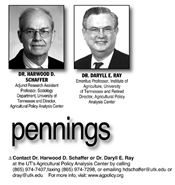|
Seven-Decade Old Vision For America Remains Relevant Today

As we write this column, the chairs and ranking members of the agricultural committees of the House and the Senate and their respective staff members are huddled together working to negotiate a compromise farm bill that can be accepted by a conference committee and then approved by the members of both chambers.
So, what is on the line? We know what the House bill looks like. It includes severe cuts to SNAP (Supplemental Nutrition Assistance Program) benefits along with more stringent qualification requirements. It also includes modifications to the Agricultural Risk Coverage (ARC) and Price Loss Coverage (PLC) programs. The Senate has indicated that the level of SNAP cuts in the House bill is unacceptable.
Given that, it would not be unreasonable to conclude that the discussions include haggling over changes to the SNAP program and figuring out how to enhance the ARC and PLC programs. In the end it looks like the farm bill they are working on will look much like the 2014 Farm Bill.
While we are waiting to see what the final farm bill will look like, we want to share some insights with you that are contained in “60 Million Jobs,” a book written by our intellectual mentor Henry Agard Wallace in 1945. At that time, he was Secretary of Commerce, having served the Franklin Delano Roosevelt (FDR) Administration as Secretary of Agriculture (1933-1941), and Vice President (1941-1945). Wallace was known as the philosopher of the New Deal.
In this book, Wallace argues that to make the transition from a wartime economy to a peacetime economy, the US will need to provide 60 million jobs by 1950 to ensure full employment. These jobs will “produce 200 billion dollars’ worth of goods and services…with a distribution of wages that will leave no family and no individual beyond the benefits of this abundant national production.”
He also provided words from FDR’s Economic Bill of Rights (for a full listing of these rights see: https://tinyurl.com/34w39ca) that we can use to measure the effectiveness of the coming farm bill: “The right of every farmer to raise and sell his[/her] products at a return which will give him[/her] and his[/her] family a decent living.” We couldn’t have laid out our policy beliefs more succinctly.
In his book, Wallace also offers some principles to his 1945 audience that resonate today.
“It is absolutely essential…that we squarely face the problem of racial and religious discrimination and propaganda-bred hatred.
“Social tensions, few or many, would be intolerable in our national life for any reason. But when 13 million of our people are Negroes, 23 million are Catholics, and 5 million are Jews – a total of about one-third of our population – the existence of social tensions must be faced with boldness and courage. If America is to attain full employment and lasting peace at home, it cannot afford the social chaos of racial and religious discrimination.
“Nazi barbarism began with these same racial and religious prejudices and hatred…. It is quite clear that any organized group which would seek, through propaganda-inspired race and religious prejudice and hatred, to divide the people is guilty of the worst kind of fraud and crime against man and society.”
After noting the increase in the proportion of women in non-agricultural jobs, Wallace wrote, “women proved in war production that they could do as well as men in many jobs and better than men in a few jobs…. [I]t is estimated that almost half of the women who sought and found jobs during the war will keep them if given the opportunity to do so.” Many farms in existence today would not be around if it were not for wives who took a job in town to provide extra income and health care benefits for her farm family.
Though the details may be different from those described by Wallace, his vision for an America in which all people share fully in its abundance is as relevant today as it was 73 years ago. ∆
DR. HARWOOD D. SCHAFFER: Adjunct Research Assistant Professor, Sociology Department, University of Tennessee and Director, Agricultural Policy Analysis Center
DR. DARYLL E. RAY: Emeritus Professor, Institute of Agriculture, University of Tennessee and Retired Director, Agricultural Policy Analysis Center
|
|